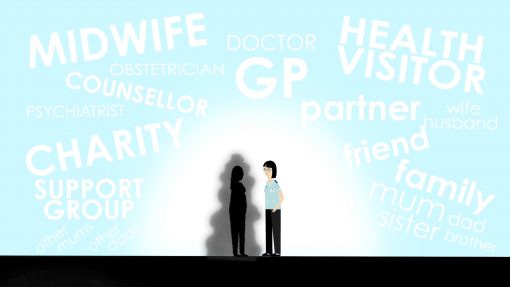Support
If you or someone you know, is struggling with mental wellbeing issues, help is available. Finding support early on is key. Everyone is different, so try to find what works best for you.
First steps
We asked people with experience of perinatal mental health problems what helped them, and they said:
- Don’t try to do too much. Be kind to yourself and just do the best you can.
- Look after yourself – think about what makes you feel good e.g. exercise, art, time alone, seeing friends.
- Encourage your family and close friends to keep an eye on your wellbeing (they may spot signs and changes in you before you do).
- Accept help if offered and ask for it if you feel you can.
- If you or a family member have (or have had) mental health problems do tell your midwife from the start (or as soon as possible) so that they can offer you the support you may need.
- If you’re struggling, tell someone you trust – this could be family, friends or a health professional. You may have to try more than one person.
- Don’t be afraid to ask your doctor (GP, paediatrician or obstetrician), midwife or health visitor about getting the right help, including information on medication, counselling, bonding with your baby, breastfeeding support or strategies to aid relaxation and improving sleep.
- Join a support group to connect with other parents – see list of organisations on this page
How to start a conversation
It can be difficult to know how to raise the subject of how you’re feeling even if someone asks.
- It might help you to write down how you are feeling before you start the conversation. You can refer to your notes as you talk.
- If you don’t know how to start, use one of these sentences: I’m struggling…. I’m not coping… I’m anxious/worried/depressed/confused… I need help/support…
- If you don’t want to have a conversation face-to-face you could try to message a friend, family member, or charity.
- Try calling a phone helpline if you don’t feel comfortable speaking to someone you know. This can be anonymous and there will be trained staff/volunteers who are used to talking to people experiencing problems. Once you’ve had that first conversation it may make it easier to open up to others.
- If talking to your GP, obstetrician, midwife or health visitor, you could write notes before your appointment to help you describe how you are feeling.
- It’s your right to see another doctor if you want. If you’d like a second opinion then ask to see another GP at the same practice or change surgery if necessary.



